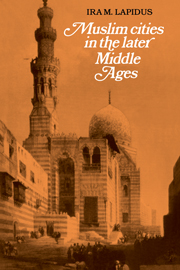Book contents
- Frontmatter
- Contents
- PREFACE
- INTRODUCTION
- CHAPTER I A HISTORY OF CITIES IN THE MAMLUK EMPIRE
- CHAPTER II THE MAMLUK REGIME IN THE LIFE OF THE CITIES
- CHAPTER III THE URBAN SOCIETY
- CHAPTER IV THE POLITICAL SYSTEM: THE MAMLUK STATE AND THE URBAN NOTABLES
- CHAPTER V THE POLITICAL SYSTEM: THE COMMON PEOPLE BETWEEN VIOLENCE AND IMPOTENCE
- CHAPTER VI CONCLUSION: SOCIETY AND POLITY IN MEDIEVAL MUSLIM CITIES
- BIBLIOGRAPHICAL NOTES
- INDEX
CHAPTER II - THE MAMLUK REGIME IN THE LIFE OF THE CITIES
Published online by Cambridge University Press: 24 November 2009
- Frontmatter
- Contents
- PREFACE
- INTRODUCTION
- CHAPTER I A HISTORY OF CITIES IN THE MAMLUK EMPIRE
- CHAPTER II THE MAMLUK REGIME IN THE LIFE OF THE CITIES
- CHAPTER III THE URBAN SOCIETY
- CHAPTER IV THE POLITICAL SYSTEM: THE MAMLUK STATE AND THE URBAN NOTABLES
- CHAPTER V THE POLITICAL SYSTEM: THE COMMON PEOPLE BETWEEN VIOLENCE AND IMPOTENCE
- CHAPTER VI CONCLUSION: SOCIETY AND POLITY IN MEDIEVAL MUSLIM CITIES
- BIBLIOGRAPHICAL NOTES
- INDEX
Summary
THE STATE AND THE PRIVATIZATION OF POWER
No force in the life of the cities of Syria and Egypt was of greater importance than the Mamluk state, for organized urban life depended on the intimate participation of the Mamluks in many important aspects of urban affairs. This participation, however, was complicated by the fact that the Mamluk regime was a government of slave soldiers, mostly Turks and Circassians, who not only differed racially but in origin, language, ethos, and privilege from the largely Arabic speaking peoples of Egypt and Syria over whom they ruled. The Mamluks were recruited as slaves in the Caucasus and the Russian steppes while still young, and though converted to Islam, remained isolated from their subjects by a system of upbringing which confined them to barracks and won their sole allegiance to the emirs who trained them and to their brothers in arms. No study of Mamluk “court culture” has yet been made, save of the taste for military sports and games, but we know well enough of the lack of mutual comprehension between the populace and the foreigners, who cannot have been better loved for their monopoly of military skill and for the dependence of the rest of the society upon them. A wide gulf separated the rulers and the ruled who could never aspire to military positions and, thus, to an important place in the state.
- Type
- Chapter
- Information
- Muslim Cities in the Later Middle Ages , pp. 44 - 78Publisher: Cambridge University PressPrint publication year: 1984

